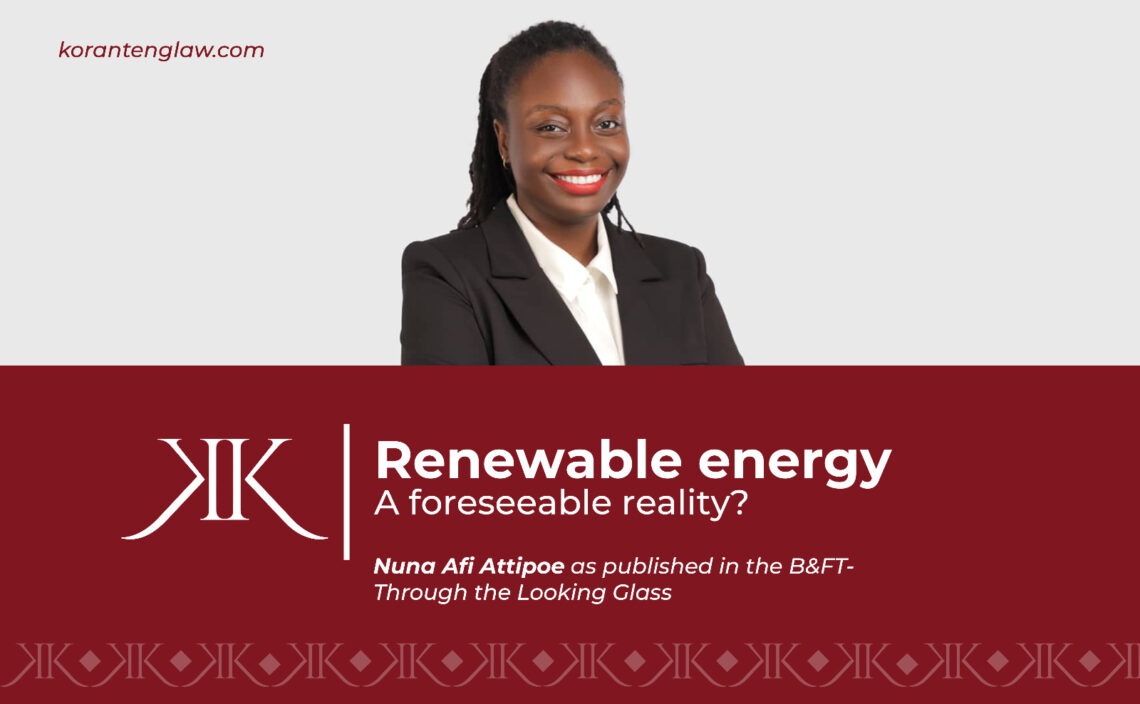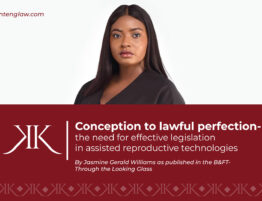
Through The Looking Glass with Nuna Afi Attipoe: Renewable energy – a foreseeable reality?
As the world continues to strive for a more environmentally sustainable future by understanding climate change and developing ways to mitigate its adverse effects, the energy sector has been playing a crucial role in these conversations.
Specifically, the renewable energy sector has been determined to be a vital solution as it aids in the mitigation of the effects of climate change by reducing greenhouse gases and providing diverse sources of energy.
Renewable energy, sometimes referred to as clean energy, is energy that comes from natural sources that are constantly replenished or regenerate naturally. These sources of energy include solar, wind, hydroelectric power, biomass energy, geothermal, and ocean (tidal and wave energy). This class of energy is known to have low or zero carbon footprint and are therefore not classified as a major contributor to the emission of greenhouse gases.
In a world where energy consumption is at an all-time high, due to urbanization, economic development and a rising population, non-renewable energy namely fossil fuels such as coal, oil and gas, are major contributors to climate change. There have been efforts to diversify the sources of energy for the purposes of slowing down rapid climate change and further attaining a more environmentally sustainable future.
As the demand for electricity increases in Ghana, the Government of Ghana has expressed its commitment to producing sustainable sources for electricity generation. In 2016, Ghana signed the Paris Agreement, an international treaty that is aimed at tackling the negative effects of climate change.
This agreement is viewed as an ambitious climate action plan that requires its 195 signatories to submit updated national climate action plans known as Nationally Determined Contribution (NDC). Ghana’s signature to this treaty establishes the government’s commitment to include renewable energy into the nation’s body of energy supply.
Legal framework of renewable energy in Ghana
In an effort to develop the renewable energy sector in Ghana, there is a legal framework that exists to facilitate and govern the industry to ensure its full potential. The Renewable Energy Act, 2011 (Act 832) as amended by the Renewable Energy (Amendment) Act, 2020 (Act 1045) are the primary legislations that governs the industry.
Other policies and implemented programs that contribute to the establishment, development and promotion of the renewable energy industry include the National Energy Policy, the Renewable Energy Master Plan, and the National Energy Transition Plan.
The purpose of the Renewable Energy Act is to provide for the “development, management, utilization, sustainability and adequate supply of renewable energy for the generation of heat and power production in an environmentally stable manner”.
Section 2 of the Act defines renewable energy as consisting of wind, solar, hydro, bio-fuel, biomass, landfill gas, sewage gas, geothermal energy, ocean energy, and any other designated sources by the Minister. The Act also bestows the responsibility of implementing its provisions on the Energy Commission (EC).
Some of the Energy Commission’s responsibilities in the development of renewable energy include providing advice on renewable energy, promoting collaboration between the government and private sector stakeholders and civil society, promoting and supporting local manufacture of components to accelerate the growth of renewable energy sources.
Other relevant institutions such as the Public Utilities Regulatory Commission, the Environmental Protection Agency, the Water Resources Commission, Lands Commission, Forestry Commission, National Petroleum Authority, and the Ghana Standards Authority, amongst others, also work with the Energy Commission to develop, manage, and utilize renewable energy in Ghana.
It is evident from the plethora of institutions involved in the development and management of renewable energy that the Act exists to ensure that the development and promotion of renewable energy is holistic and sustainable in order to maintain longevity in Ghana’s body of energy supply. Another objective of the Act is to improve on energy security by advocating for more sustainable sources that protect the environment.
As Ghana has pledged to the global initiative of reducing emissions of greenhouse gases, carbon footprint and overall reliance on fossil fuels, the phenomenon of renewable energy is even more important.
Lastly, the development of renewable energy sources is likely to attract investments and generate employment opportunities within the sector, further contributing to the nation’s sustainable economic development.
Licensing for renewable energy projects
For any commercial activity to be undertaken in the renewable energy sector, a license must be obtained and further granted by the Energy Commission. The commercial activities in the renewable energy sector may include the production, transportation, storage, distribution, importation, exportation, installation and maintenance.
The license may be granted to either a citizen, a body corporate registered under the Companies Act, 2019 (Act 992) or a partnership registered under the Incorporated Private Partnerships Act, 1962 (Act 152).
It is noteworthy that foreign investors may participate in the renewable energy sector by incorporating a company or a joint venture with a Ghanaian company or individual which meets the relevant requirements of the Ghana Investment Promotion Centre.
The duration of the license issued by the Energy Commission under the Renewable Energy Act can vary between 5 to 20 years. A license granted may also be renewed by an application for renewal made to the Energy Commission not later than sixty (60) days before the license expires.
Power Purchase Agreements (PPAs)
The primary method for the government to procure large-scale energy supply is through power purchase agreements (PPAs) with the Electricity Company of Ghana being the main procurement entity involved.
Per section 25 of the Renewable Energy (Amendment) Act, 2020 (Act 1045) the contracting of a power purchase agreement with a renewable energy source must be by a competitive bidding process.
Renewable energy operators may enter into such agreements to provide energy for the generation of electricity as Ghana aspires to attain 100% electrification. This is especially lucrative to private sector renewable energy industry players as the nation aspires to increase its electricity access and more than ever, energy, specifically renewable energy for electricity generation is needed.
Renewable energy projects in Ghana
Solar Energy
The generation of electricity through solar photovoltaic (PV) is becoming one of the ways the energy supply is being enhanced and diversified. Due to its feasibility and environmentally sustainable advantages, Ghana is gradually turning its attention to generating electricity through this type of renewable energy. For certain projects and areas, solar energy is being used to generate electricity as a response to diversify the nation’s energy supply as well as increasing access to electricity through renewable means.
Firstly, the geographical location of Ghana makes it a very capable and suitable candidate for the production of solar energy. The advantageous tropical location grants us abundant access to solar radiation throughout the country with the highest concentration in the northern part of the country.
Currently, several companies such as Meinergy Technology, Northpark Power, Energyone, Sinohydro for Bui Power Authority have engaged in development and building of solar farms in Ghana thereby indicating that there is an interest to explore the potentially successful industry of solar energy.
Secondly, Volta River Authority has been reported to be involved in the establishment of a number of solar plants in the northern parts of Ghana in order to contribute to the government’s agenda of renewable energy development and to enhance the diversification of Ghana’s energy mix. Some of these projects include the 13MW Kaleo Plant, the 2.5MW solar plant in Navrogono, and the 6.5MW Lawra Plant.
Additionally Blue Energy Plc., a United Kingdom-based renewable energy developer is a developing a 155MW solar PV plant at Nzema in the Western Region of Ghana and when completed will be largest solar PV plant in Sub-Saharan Africa. Between the various initiatives by the government through its agencies such as the VRA and the various companies engaged in activities surrounding solar energy and its production, it appears that the solar industry is an attractive sector for investors.
The legal framework also allows for tax exemptions and certain subsidies for solar related materials. All solar panels imported to Ghana are exempt from Value Added Tax (VAT) and the import duty for industrial/ energy plant, machinery or equipment is waived and lastly, all off grid components benefit from VAT exemptions as well.
Hydropower
Another source of renewable energy is hydropower which has been patronized by Ghana since 1966 through the construction of the infamous Akosombo Dam. This has been the main source of electricity supply in Ghana and this source of energy is known as hydropower. Akosombo Dam together with the Kpong Dam have generated 65% of the nation’s electricity.
The Bui Dam which was constructed in 2013 also significantly contributes to the nation’s electricity supply. Although these large-scale dams amongst other medium and small-scale dams have served the country well, the cost-prohibitive nature of their construction, as well the limited supply of water bodies in Ghana that are feasible for power production, limits the full exploitation of this energy source. Due to this, the government although maintaining hydro power in the energy mix, has sought to add other forms of energy to the energy generation mix to ease the pressure.
Wind Energy
Wind energy has been poised as a significant potential renewable energy supply as it is cheaper and environmentally friendly. Ghana has the potential to generate wind energy in certain locations in the country. Some of these include the Eastern Region, parts of the Volta region, and Greater Accra region.
According to expert opinion, Ghana has a technical potential to produce wind energy at 82.8TWh yearly. The Ayitepa Wind Farm is a 225MW onshore wind project that is being developed in Ningo-Prampram. There is, therefore, a need to build grid infrastructure and modernize current wind farms to realize this potential. NEK (Ghana), a Swiss company has been developing the Ayitepa Wind Farm also has other wind energy projects in various locations across the country that will produce clean, sustainable, and cheap electricity for the Ghanaian population.
The Volta River Authority is also developing 150MW of wind power in the southern part of Ghana. However, such projects have been halted due to the suspension of new licenses by the Energy Commission since 2017 as the commission wanted to develop guidelines on how power purchase agreements were contracted and to ensure that licenses are granted devoid of governmental bureaucracies. This suspension was recently lifted in April 2023.
As Ghana plans to reach at least 10percent renewable energy of its energy mix by 2030 and also realize 100percent electrification, it is crucial that the development of energy sources that are clean and renewable such as wind are explored to the fullest potential. Several institutions and entities have postulated that in order for Ghana to scale up on its energy production and diversification of its energy mix, particularly renewable energy, there must be a leveraged partnership with the private sector.
Geothermal and Ocean Energy
Other forms of renewable energy include geothermal energy and ocean energy. Geothermal energy is heat energy which is tapped from the earth whilst the ocean energy is energy tapped from the wind-wave interactions in the ocean. Although these types of energy are rather novel and the technology is still being developed, it has been said to have the potential to be a reliable source of renewable and sustainable energy.
A local Ghanaian company TC Energy in collaboration with Swedish company have been working since 2015 to create Africa’s first wave power plant. This project was however stalled but has recently reached a major agreement for financing and revival.
TC Energy is projected to install a pilot 14.5MW Tidal Wave Power Plant at Ada Foah in the Greater Accra Region. A project of this kind has been tagged to be a pioneering wave energy project in Africa.
This particular company intends to utilize sea-based wave energy converters to generate up to 100MW of electricity. Various scientific writers have suggested that Ghana could present as an excellent candidate as a destination for such these types of renewable energy due to geographical location.
Carbon Credits
Companies outside Ghana are interested in the Net Zero agenda but are having difficulty meeting the goal. To facilitate their achievement of a Net Zero standard, companies buy carbon credits to achieve this.
The Government of Ghana established the Carbon Credit Fund under the Environmental Protection Agency. The concept of carbon credits has been couched under Article 6 of the Paris Agreement to which Ghana is a signatory. Although the carbon credit market is still in its early stages, there has already been impressive growth.
In 2019, the Ghana Carbon Exchange was launched and this platform exists to facilitate the buying and selling of carbon credits and to also provide support for renewable energy projects that will reduce greenhouse emissions. According to a report by the World Bank, Ghana earned 4.8 million dollars for reducing nearly 1 million tons of carbon emissions.
The World Bank Forest Carbon Partnership Facility (FCPF) in an emissions reduction payment agreement (ERPA) will pay up to 50 million dollars for 10 million tons of carbon emissions that Ghana reduces through 2024. The carbon credit market proves to be a lucrative potential source of funding for the funding of renewable energy projects in Ghana.
Conclusion
From the above discussion, it is evident that Ghana has the legal framework that supports the development of renewable energy. The legal framework is progressive but not being actively pursued. Section 53 of Act 832 states a Renewable Energy Authority be established to oversee the implementation of renewable energy activities in the country as well as to manage the assets of the renewable energy sector on behalf of the State.
This Authority is yet to be established. However, the amendment of the Bui Power Authority Act 2020, (Act 1046) allows the Bui Power Authority to assume the role of the Renewable Energy Authority. Despite the bright prospects ahead for renewable energy, there is some hesitance persisting in the industry with regards to implementation.
Some of the factors behind the slow development of the renewable energy sector is the lack of investment and active engagement amongst industry players. There is also a lack of technical experience within the renewable energy market.
Organizations such as Association of Ghana Industries (AGI) Energy Service Centre (ESC) are making considerable efforts in boosting the adoption of renewable energy.
AGI-ESC has been set up to provide training and consultancy services for renewable energy and energy efficiency. Such initiatives will boost interest within the renewable energy field and create a lucrative market for renewable energy production in Ghana.
There are also proposed incentives such as substantial tax exemptions, on materials, machinery and equipment and import duty that are intended to make the industry investor-friendly and attractive.
Renewable energy is a foreseeable reality and not just a theory. As the world rallies to combat climate change, Ghana has positioned itself to be a key industry player by setting up comprehensive frameworks and policies that present a willingness to develop the industry.
Coupled with abundant natural resources that remain untapped and the government’s commitment to establishing workable guidelines, including the recent Ministry of Energy’s Green Mineral’s Policy, the country is poised to take advantage of future developments in the green industry to potentially become a green economy.
SOURCE: https://thebftonline.com








